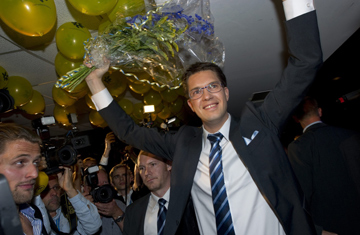
Jimmie Akesson, chairman of the Sweden Democrats, celebrates among party workers in Stockholm on Sept. 19, 2010
Swedish voters on Sunday re-elected the ruling center-right coalition, giving the Conservative Party a record 30% of the vote. It's the first time in Sweden's political history that a non-socialist Prime Minister has won a second term, and the first time the Conservatives have had such a high share of the polls. But those historic events are being overshadowed by another first, one that has politicians, the media and the public wondering which direction their country is headed: the Swedish — famous for their middle-ground politics, generous immigration policies and reputation for tolerance — also handed the far-right Sweden Democrats a place in Parliament.
Despite the Conservative Party's record share of the vote, the coalition — which also includes the Folk Party, the Center Party and the Christian Democrats — lost its overall majority after the Sweden Democrats, led by the young and charismatic Jimmie Akesson, took 5.7% of the vote. Prime Minister Fredrik Reinfeldt has until Oct. 5 to nail down a new government, and he indicated on Sunday that he would be looking to the Green Party for support. In his victory speech, Reinfeldt categorically rejected the idea of any cooperation between the coalition and the Sweden Democrats. Which means if he can't make a deal with the Greens, the coalition will have to either rule with an unstable minority government or look to a repeat election.
But as far as the Sweden Democrats are concerned, they've already won. "We have been counting on this," said Björn Söder, Secretary of the Swedish Democrats and second in command, on Sunday. Even if the coalition snubs the Sweden Democrats, the party still has a seat at the table. Its entry into Parliament signals a move to the right that has become common in Europe, which most believed Sweden was immune to. An outright Nazi party in the '90s, the Sweden Democrats have been galvanized by the debate in the country on Islam, the crime rate among migrants and the populist demand for a more restrictive immigration policy inspired by Denmark, which tightened its borders following the populist Dansk Folkeparti's move into government in 2002. But, commentators argue, the Sweden Democrats' policies would have gone mostly unnoticed had it not been for the abundant media coverage of the party in the run-up to the vote — coverage that critics blame for making the party impossible to miss and therefore boosting it into power.
Around the country and online, many Swedes are in a state of shock, worried about how the far right's gain will tarnish the nation's image. On Monday, protesters in cities such as Stockholm, Gothenburg and Malmö took to the streets and chanted anti-racist slogans in response to the Sweden Democrats' rise. Migrant-rights activist Damon Rasti says he and his friends cried when the final results were reported. "This is not the Sweden we want," he tells TIME. "I woke up and felt the bitter cold slipping in, not knowing if it was the weather or the politics. But this only strengthens us to go on."
As of Monday, all of Sweden's parties refused to hold any discussions with the Sweden Democrats. But there are other politicians who are happy to see the party come in from the fringe. "Sweden now is a normal country," Pia Kjaerskgaard, head of the Dansk Folkeparti, told reporters on Sunday. During the election campaign, Kjaerskgaard claimed that Swedish democracy was more grotesque than the rule of East European regimes, after Sweden's TV4 decided not to air a campaign ad by the Sweden Democrats that depicted Muslims as a threat to society. Charging the station with censorship, she called for election observers to be sent to Sweden. It never happened.
While Sweden may be moving a little further to the right, Robert Klemmensen, an associate professor at Denmark's Syddansk University, does not believe that Swedish politics will ever take on the aggressive rhetoric of Denmark's far-right parties. "The political sphere in Denmark is generally more confrontational than in Sweden," he says. "The Swedish will have to expect a more restrictive policy on immigration, but other areas will probably not be affected."
But for how long? Many describe the Sweden Democrats as smart, tactical and media-savvy — and warn that, left unchallenged, the party could become a growing force in the Swedish government. "They were very skilled in mobilizing the small portion of Swedish society that is critical of migrants and other ethnic groups," says Ulf Bjereld, a political science professor at Gothenburg University. "It all comes down to the Green Party. If they refuse an invitation made by Reinfeldt, then the chances of the Sweden Democrats' gaining more access to politics are greater."
By Monday afternoon, Reinfeldt still hadn't approached the Green Party about forming a government, while the Greens insisted that they wouldn't necessarily accept if he did. Political observers say the Greens will wait until the last minute before making any deal, in order to increase their chances of winning a ministerial role — preferably Minister for Environmental Affairs.
In the end, the ruling coalition could be faced with two choices: form a minority government and hope that the Green Party will support it on individual issues or call for a re-vote. Extending a hand to the Sweden Democrats, say commentators, is not an option. "The Prime Minister and his coalition would lose all political credibility by doing so, since 94% of Swedes did not vote for and are disgusted by the Sweden Democrats," says Bjereld. "I would deem such a solution unthinkable."
